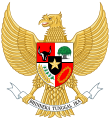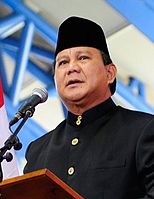
A | B | C | D | E | F | G | H | CH | I | J | K | L | M | N | O | P | Q | R | S | T | U | V | W | X | Y | Z | 0 | 1 | 2 | 3 | 4 | 5 | 6 | 7 | 8 | 9
| ||||||||||||||||||||||
| Registered | 193,944,150 ( | |||||||||||||||||||||
|---|---|---|---|---|---|---|---|---|---|---|---|---|---|---|---|---|---|---|---|---|---|---|
| Turnout | 69.58% ( | |||||||||||||||||||||
| ||||||||||||||||||||||
| ||||||||||||||||||||||
| This article is part of a series on the |
| Politics of Indonesia |
|---|
 |
Presidential elections were held in Indonesia on 9 July 2014,[1] with former general Prabowo Subianto contesting the elections against the governor of Jakarta, Joko Widodo; incumbent president Susilo Bambang Yudhoyono was constitutionally barred from seeking a third term in office.[2][3] On 22 July the General Elections Commission (KPU) announced Joko Widodo's victory. He and his vice president, Jusuf Kalla, were sworn-in on 20 October 2014, for a five-year term.[4]
According to the 2008 election law, only parties or coalitions controlling 20% of DPR seats or winning 25% of the popular votes in the 2014 parliamentary elections are eligible to nominate a candidate. This law was challenged in the Constitutional Court,[5] but in late January 2014, the court ruled that the requirement would stand for this election.[6] No party exceeded the threshold in the 2014 legislative elections; therefore, two coalitions were formed.
Electoral system
Arrangements for the conduct of elections in Indonesia are carried out under the supervision of the KPU.[7] The presidential elections in 2014 were carried out under the 2008 election law (Undang-undang, or UU) No. 42 on the election of a president and vice president.[8]
Arrangements for nominations An important requirement, set out in Law No. 42 of 2008 (Clause 9), is that nominations of candidates for the presidential election may only be made by a party (or coalition of parties) which has at least 20% of the seats in the national parliament (the DPR, or the Dewan Perwakilan Rakyat) or which received 25% of national votes in the previous national legislative election for the DPR. In practice, these conditions set a rather high bar for nomination. The likelihood is that only candidates supported by one of the major parties, perhaps with some support from several of the minor parties, will be able to meet the conditions for nomination. Among other things, the effect of this requirement is likely to be a strict limit on the number of candidates who will be able to stand for the presidency.
Indonesia worked towards implementing e-voting the 2014 general elections[9] using electronic identity cards (e-KTP), which had been tested in six districts/cities, namely Padang, West Sumatra; Denpasar, Bali; Jembrana, Bali; Yogyakarta, Java; Cilegon, West Java; and Makassar, (South Sulawesi).[10]
However, the system was not ready for the election. Therefore, voters still voted on paper by punching a hole in one of the two candidates' photograph, number, or name. The ballots were then collected and counted at the village level, then city/regency level, province level, and finally the national level.
Political parties
Candidates for president are nominated as individuals (along with a vice-presidential running partner); however, support from the main political parties is likely to play a crucial role in influencing the result. Partly for this reason, the highly changeable map of political parties in Indonesia contributes to the uncertainty of political trends in the run-up to the presidential election. In recent years, the number of political parties contesting major elections (for both national and regional parliaments and the presidential elections) has varied considerably.
- In 2004, 24 parties contested the national elections and 16 secured enough seats to be represented in the national parliament.
- In 2009, 38 parties contested the national elections and nine secured enough seats to be represented in the national parliament.
- In 2014, 12 parties contested the national legislative elections on 9 April, and three more were authorised to run candidates in Aceh. (Brief details of the parties are listed at the relevant page on the website of the KPU.)[11] It is expected that candidates for president who hope to mount an effective campaign will need to secure the support of at least one of the major parties as well as several other smaller parties. Details of the twelve main national parties who qualified to mount nationwide political campaigns are as follows:
Summary of registered parties support
| Known as | Party | English name | Supporting | DPR seats | DPR seats % | Legislative votes % | |
|---|---|---|---|---|---|---|---|
| Gerindra | Partai Gerakan Indonesia Raya | Gerindra Party | Nominee: Prabowo Subianto (Gerindra) Running mate: Hatta Rajasa (PAN) |
Majority coalition: Gerindra/Golkar/PPP/PKS/PAN/Demokrat 353 / 560 |
63.04% | 59.12% | |
| Golkar | Partai Golongan Karya | Golkar | |||||
| PPP | Partai Persatuan Pembangunan | United Development Party | |||||
| PKS | Partai Keadilan Sejahtera | Prosperous Justice Party | |||||
| PAN | Partai Amanat Nasional | National Mandate Party | |||||
| PBB | Partai Bulan Bintang | Crescent Star Party | |||||
| PD | Partai Demokrat | Democratic Party* | |||||
| PDI-P | Partai Demokrasi Indonesia Perjuangan | Indonesian Democratic Party of Struggle | Nominee: Joko Widodo[12] (PDI-P) Running mate: Jusuf Kalla (Golkar) |
Minority coalition: PDI-P/Hanura/NasDem/PKB 207 / 560 |
36.96% | 40.88% | |
| Hanura | Partai Hati Nurani Rakyat | People's Conscience Party | |||||
| NasDem | Partai NasDem | Nasdem Party | |||||
| PKB | Partai Kebangkitan Bangsa | National Awakening Party | |||||
| PKPI | Partai Keadilan dan Persatuan Indonesia | Indonesian Justice and Unity Party | |||||
- Parties that are in light grey shows that they do not pass the 2014 Parliamentary Threshold of 2.5% of the national legislative vote. They were also initially barred participation in the next election for the same reason.
- The leader of Democratic Party and sitting President Susilo Bambang Yudhoyono was officially neutral in the election.[13]
Candidates
Nominees
|
| ||||||||||||||||||||||||||||||||
Previously considered potential
Before the national legislative elections on 9 April 2014, the following candidates had declared their intention to run for president. Following the legislative elections, these candidates were unable to reach the threshold.
| Party | Candidate | Details |
|---|---|---|
| Golkar | Aburizal Bakrie | Chairman of the Golkar party.[14] Formerly, there had been discontent in some quarters within the party about Bakrie's candidature. There had been some talk of a possible move to reconsider the decision to nominate him.[15] However, Golkar appears united behind him as the official candidate, although some members (especially in Eastern Indonesian region) defect to support Jusuf Kalla |
| Hanura | Wiranto | Former Commander of the Indonesian Armed Forces, 2004 presidential nominee, and 2009 vice-presidential nominee[16] |
| Crescent Star Party | Yusril Ihza Mahendra | Former chairman of the Crescent Star Party (PBB). A top lawyer and a specialist in government laws of Indonesia.[17] |
| United Development Party | Suryadharma Ali | Chairman of the United Development Party (PPP). Recently been announced official suspect by the Corruption Eradication Commission (KPK) on the case of Umroh budget corruption. |
Polling
NOTE: The quality of polling in Indonesia varies considerably. Furthermore, some of the polling institutions provide little information about their polling methods. The data set out below should therefore be treated with care.
| Pollster | Date | Highlights |
|---|---|---|
| Soegeng Sarjadi Syndicate (SSS) | 3–8 October 2011 | Prabowo Subianto 28%, Mahfud MD 10.6%, Sri Mulyani Indrawati 7.4%, Aburizal Bakrie 6.8%, Said Akil Siradj 6%, Muhammad Sirajuddin Syamsuddin 5.2%, Pramono Edhie Wibowo 4.2%, Jusuf Kalla 4.0%, Djoko Suyanto 3.2%, Hatta Rajasa 2.8%, Surya Paloh 2.5%. |
| Jaringan Suara Indonesia (JSI)[permanent dead link] | 10–15 October 2011 | Megawati Soekarnoputri 19.6%, Prabowo Subianto 10.8%, Aburizal Bakrie 8.9%, Wiranto 7.3%, Hamengkubuwono X 6.5%, Hidayat Nur Wahid 3.8%, Surya Paloh 2.3%, Sri Mulyani Indrawati 2.0%, Kristiani Herawati 1.6%, Hatta Rajasa 1.6%, Anas Urbaningrum 1.5%, Sutanto 0.2%, Djoko Suyanto 0.2%. |
| Reform Institute | October 2011 | Aburizal Bakrie 13.58%, Prabowo Subianto 8.46%, Jusuf Kalla 7.06%, Hidayat Nur Wahid 5.17%, Kristiani Herawati 4.13%. |
| Center for Policy Studies and Strategic Development (Puskaptis) | 22 January – 2 February 2012 | Prabowo Subianto 16.4%, Hatta Rajasa 14.6%, Aburizal Bakrie 13.5%, Megawati Soekarnoputri 13%, Akbar Tandjung 12.7%. |
| Indonesian Survey Institute (LSI) Archived 27 February 2012 at the Wayback Machine | 1–12 February 2012 | Megawati Soekarnoputri 22.2%, Prabowo Subianto 16.8%, Aburizal Bakrie 10.9%, Wiranto 10.6%, Hatta Rajasa 5.4%, other names 10.3%, undecided voters 23.8%. |
| Asia Pacific Association of Political Consultant (APAPC) | March 2012 | Zdroj:https://en.wikipedia.org?pojem=Indonesian_presidential_election,_2014










